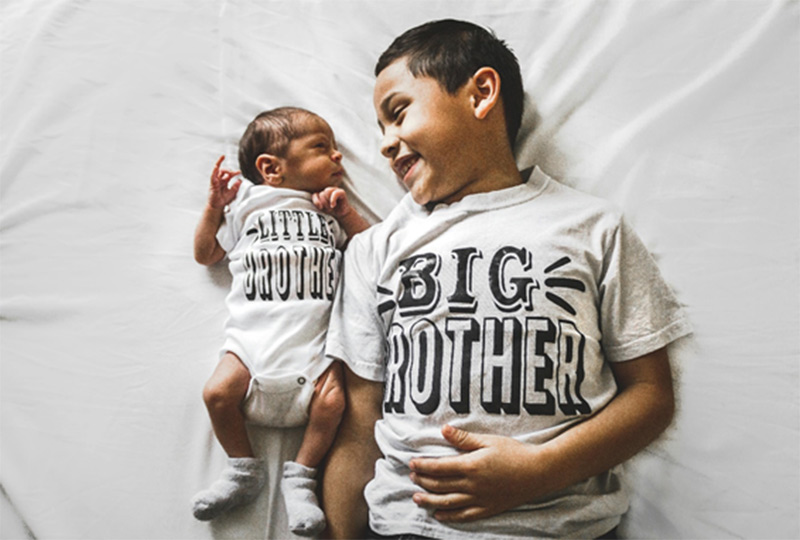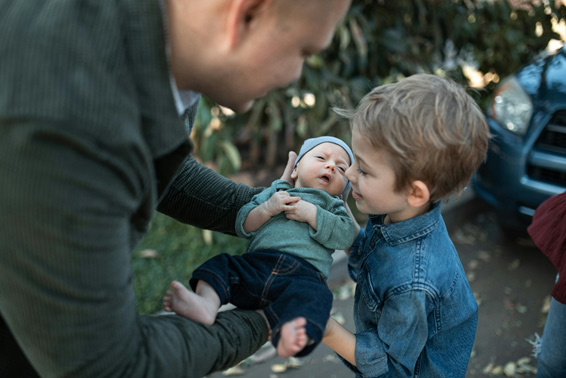
You have probably heard a parent say at some point: “I treat all my children equally”. These statements are usually attempts to demonstrate impartiality or to show that they love all their children the same. And while we do not doubt the love and affection they feel for them, the reality is that treating them exactly the same way is impossible for many reasons.
One of these reasons is birth order. The eldest sibling has experienced, at least for a time, being an only child, and with the arrival of a sibling, their role within the family inevitably changes. Parents have less time for them because they must also care for the new family member, and expectations for them shift, going from being the centre of attention to being a role model for their younger sibling.
Being the firstborn carries certain burdens and responsibilities, explicitly and implicitly demanded by parents and society. While some of these may be appropriate, others can have a negative impact on their emotional and psychological development. From general child psychology, we help you differentiate them.
Responsibilities an older sibling should never assume
Sometimes, parents or relatives make the mistake of burdening their older children with responsibilities that do not belong to them, such as taking care of younger siblings. Additionally, adults tend to reinforce these behaviours with phrases like “You take such good care of your sister!” or “It’s your responsibility to look after your brother,” without realizing the weight this can carry.
An older sibling should never take on the role of a parent, and therefore, they should never have the following obligations:
- Being the primary caregiver and ensuring the younger sibling’s safety. It is not their responsibility to watch over the youngest.
- Sacrificing their free time or leisure to take care of their younger sibling. Play and rest are fundamental for healthy socio-emotional development.
- Bearing most of the household chores. This situation is more common when the eldest is a girl, reinforcing gender inequalities.
- Making important decisions regarding their younger sibling. Parenting and education should be the sole responsibility of the parents.
- Being responsible for the younger sibling’s emotional well-being. While they can offer support and share their experiences, they should not take on problems that are not their own.
- Acting as a mediator in family conflicts. It is not their role to intervene between the younger sibling and the parents or between the parents themselves.
Psychological impact of carrying these responsibilities

Imposing these responsibilities on the older sibling can lead to the following consequences:
- Stress and anxiety from failing to meet unrealistic expectations. It is inevitable that, as the eldest, they become a role model, but demanding excessive responsibilities can lead to overwhelming pressure. They may end up feeling like they can never make mistakes and that they must do everything perfectly.
- Feelings of inferiority upon perceiving that their parents give more importance to taking care of the younger sibling.
- Resentment when comparing themselves to their friends and realizing that they do not get to enjoy their childhood as much as they do.
- A tendency for excessive self-sacrifice in adulthood, prioritizing the needs of others over their own.
- Authoritarian behaviour, believing that their younger sibling must obey them in everything. This can create conflicts and a backlash effect in the younger sibling.
- Rejection of the younger sibling as a form of protest the demands imposed by the parents.
- Lack of autonomy in the younger sibling if they become dependent on the older sibling for everything.
These dynamics can persist into adulthood, affecting the sibling relationship and even influencing how they form bonds in the future.
Responsibilities an older sibling can take on
The responsibilities of an older sibling depend on the age of both siblings and evolve over time. Some appropriate responsibilities could be:
- Being a role model without the pressure of doing everything perfectly. Their experience can help pave the way for the younger sibling in certain situations, such as when they start going out with friends.
- Teaching voluntarily things they have already learned, without it becoming an obligation.
- Spending quality time together, strengthening their relationship through games, conversations, or shared activities.
- Providing emotional support, but without taking full responsibility for their younger sibling’s well-being.
- Doing household chores that are more challenging than those of the younger sibling, but still age-appropriate, so both siblings progressively learn autonomy.
It is essential that parents take the lead in parenting and that the older sibling can experience childhood or adolescence without carrying a burden that does not belong to them. If you think you may have imposed this responsibility on your eldest child, or if in your childhood you felt overwhelmed by this role and it still affects you to this day, it is possible to work on it. Do not hesitate to contact us if you feel the need.
Aina Fiol Veny
Psychologist Col. Nº B-02615





